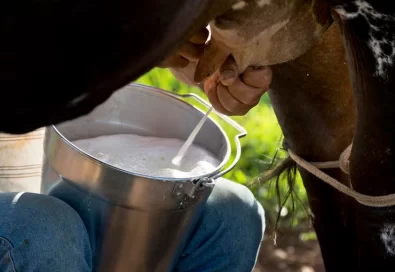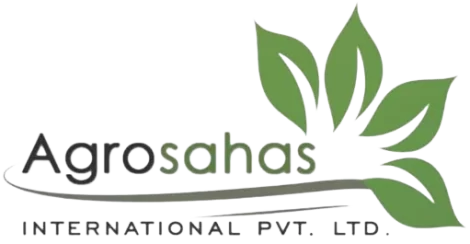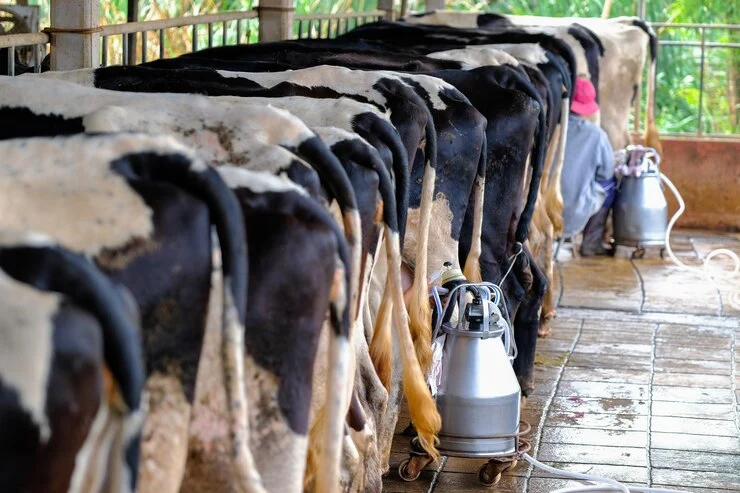For dairy farmers, one of the primary goals is to maximize milk production while maintaining the health and well-being of their cows. At Kukuchku, we understand the importance of providing high-quality, nutritionally balanced feeds that not only promote healthy cows but also significantly boost milk yield. In this blog, we’ll explore how our cow feeds contribute to improved dairy production, answering key questions about what you can feed your cows, the best fodder, and how to enhance both the quality and quantity of milk.
What Can I Feed My Dairy Cow to Increase Milk Production?
To increase milk production in dairy cows, it’s essential to provide a diet rich in energy, protein, vitamins, and minerals. A high-quality feed like Kukuchku Cow Feed is formulated to meet these nutritional needs:
- Energy-Rich Ingredients: Corn, barley, and other grains are great sources of carbohydrates, providing cows with the energy required to produce more milk. Kukuchku Cow Feeds are packed with energy-dense ingredients to support high milk yields.
- Protein Supplements: Protein is critical for milk production, particularly for supporting the cow’s metabolism and ensuring healthy growth. Our feeds are enriched with protein from soybean meal and other protein sources to help maintain and improve milk output.
- Vitamins and Minerals: Calcium, phosphorus, and Vitamin D are crucial for milk production. Kukuchku Cow Feeds are fortified with these essential minerals and vitamins to ensure cows have everything they need to sustain high production levels.
- Fiber for Digestive Health: Fiber is essential for proper digestion, and forages such as alfalfa are key components of a cow’s diet. At Kukuchku, we understand the balance between concentrate and fiber to optimize digestion and nutrient absorption, which translates to better milk production.

What is the Best Fodder for Dairy Cows?
The quality of fodder directly impacts a cow’s milk production. The best fodder for dairy cows includes a mix of legumes, grasses, and silage that provide a balanced source of nutrition. Here are some of the top options:
- Alfalfa: Known for its high protein and calcium content, alfalfa is one of the best forages for dairy cows. It supports both milk yield and cow health.
- Maize Silage: A highly digestible source of energy, maize silage is often used to boost milk production in dairy cows. It’s rich in carbohydrates, helping cows maintain the energy needed for high milk yields.
- Napier Grass: Another excellent choice, Napier grass is a high-yielding fodder crop with a good balance of energy and protein, making it a staple for many dairy farmers.
- Sorghum: Sorghum is another high-energy fodder that can be included in a dairy cow’s diet, providing essential nutrients to support milk production.
At Kukuchku, we ensure our cow feeds complement these fodders, enhancing their effectiveness and providing a comprehensive nutritional profile for maximum dairy output.
How Do You Increase the Quality of Cow’s Milk?
Increasing the quality of milk goes beyond just quantity. The fat and protein content, along with overall milk hygiene, are essential factors in producing premium-quality milk. Kukuchku Cow Feeds are designed to improve both the quantity and quality of milk through the following methods:
- Balanced Diet: By providing cows with a well-balanced diet that includes essential fatty acids and proteins, you can boost the fat and protein content of their milk. Kukuchku feeds include balanced ingredients that support the production of high-quality milk with desirable nutritional properties.
- Minerals and Vitamins: The inclusion of minerals like calcium and phosphorus ensures strong bones and proper milk synthesis. We also add Vitamin A and E to improve the immune health of cows, which indirectly contributes to milk quality.
- Healthy Fat Supplements: Adding healthy fat sources like soybean or canola meal to a cow’s diet can increase milk fat content, resulting in richer, higher-quality milk.
- Proper Hydration: Access to clean water is crucial for cows to produce high-quality milk. Kukuchku feeds work best when cows are well-hydrated, which optimizes digestion and nutrient absorption.

What Are 5 Factors That Affect Milk Production in Cows?
Several factors can impact milk production in dairy cows. Here are five key ones:
- Nutrition: The most significant factor affecting milk production is the cow’s diet. A high-quality feed like Kukuchku Cow Feed ensures that cows get the right balance of energy, protein, and nutrients to produce high volumes of milk.
- Genetics: Genetics also play a role in how much milk a cow can produce. While you can’t change a cow’s genetics, you can maximize her potential by providing proper nutrition and care.
- Health: Healthy cows produce more milk. Proper vaccinations, deworming, and good hygiene all contribute to cow health, which is why Kukuchku Feeds include ingredients that support immune function.
- Management Practices: Proper milking routines, comfortable housing, and minimal stress contribute to better milk production. Stress can reduce a cow’s ability to produce milk, so maintaining a calm and comfortable environment is essential.
- Stage of Lactation: Cows in the early stages of lactation naturally produce more milk. By supporting their nutritional needs during this period with high-quality feeds like those offered by Kukuchku, you can maximize production during this crucial time.
Conclusion
At Kukuchku, we’re committed to helping dairy farmers achieve both higher milk production and improved milk quality. Our cow feeds are formulated to provide the essential nutrients dairy cows need to thrive, ensuring they produce more milk and better-quality milk. By combining our feeds with the right fodder and management practices, you can optimize your dairy operation for success.




